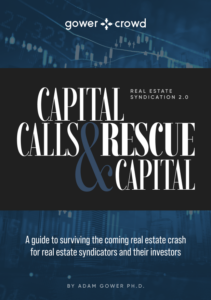Introduction
After years of what some considered unsustainable growth, many experts predicted a real estate recession was on the horizon in 2020. Few would have anticipated the COVID-19 crisis, but nevertheless, here we are. The global pandemic has wreaked havoc on the economy, leading some to believe that a spate of distressed properties will be coming online in the months to come.
Finding distressed properties for sale near you can be challenging. The tools historically used by investors are rapidly evolving as technology and predictive analytics become more advanced. In this article, we look at the top tricks for finding distressed real estate for sale regardless of asset class or location.
Related: When is a Value Added Property a Good Real Estate Investment?
What is a Distressed Property?
The term “distressed property” is used freely by real estate investors in reference to any property that is under-performing. This is obviously a vague definition, since under-performing can mean different things to different people.
A more nuanced definition is the one commonly used by lenders. Lenders consider a distressed property to be one in which the owner is 30 days behind on their mortgage payment. From a bank’s perspective, this is when a property becomes delinquent on the mortgage, and therefore, falls into the category of “distressed” real estate. In cases like these, the owner is typically facing some sort of financial hardship.
Once a mortgage goes beyond 90 days delinquent it technically becomes a non-curable loan. This means that irrespective of whether a borrower comes in and makes up for interest, fees, penalties and other charges, the loan must sit on the bank’s books as a non-performing loan – and if too many of these start to accumulate, the bank must take on more capital, or sell the asset to get it off their books.
But as we’ll go on to show, there’s an important distinction to be made between a property that is physically distressed versus one that is financially distressed.
Oftentimes, an owner is underwater on their mortgage but the physical asset is otherwise in great shape. Situations like these can lead to great deals for those looking to buy distressed property for sale.
Physically
When most people think of “distressed real estate,” they think of a property in failing physical condition. Imagine properties where the roof has caved in or a leak has caused widespread damage. These properties suffer from prolonged deferred repairs and maintenance.
Short of obvious damage, there are also situations in which a property is considered physically distressed because it has not been updated in years. Many of the property features, such as appliances and fixtures, are considered functionally obsolete. Over time, this will make the property more difficult to rent at market rates. Properties like these usually require a significant injection of cash in order to improve to market standards—cash that some owners simply don’t have on hand, and as a result, the property continues to physically deteriorate.
Another form of physical distress is when a building is found to contain hazardous materials. These may occur in either its construction or sub-terranean. For example, a building that has stood for years and is now undergoing renovations may be found to contain asbestos that had not previously been known to exist. This can add a significant line item to renovation costs that had not been anticipated. Similarly, land that previously had gas stations or dry cleaners amongst other potentially ‘toxic’ uses during its history, may also be subject to the cost of cleaning up the contamination before any positive economic use can be derived from the asset.
Financially
In reality, there really is only one kind of distress in real estate and that is distressed caused by finance. As noted above, even with environmental issues, a piece of real estate is only distressed to the extent it will require capital that has not been budgeted for to fix it. The real estate itself is fine; it’s the structure of the capital – the capital stack – that is distressed.
For example, and as noted above, a property is considered financially distressed when the owner has fallen 30+ days behind on their mortgage payments, however there are different ways to look at financial distress. The first and simplest way to evaluate financial distress is when the mortgage, taxes or other obligations are not being paid. In cases like these, there will often be a lien against the property that can be found via a public records search (more on this to come).
This speaks specifically to the debt layers on a property; if they are too burdensome for the cash flow to carry, then the asset becomes distressed.
A second, and more nuanced way, to evaluate financial distress is to look at a property’s loan-to-value ratio to spot a dislocation between the asset value and the actual exposure to excessive debt in the capital stack. See, most loans are originated based on a 65-70% loan-to-value ratio. In the event of a market correction, such as the one many expect will be induced by the COVID-19 crisis, property values may come down.
Let’s say someone has a $700,000 mortgage on a property assumed to be worth $1 million. After the market correction, that property drops 30% in value and is now only worth $700,000. All equity has been wiped out. In cases like these, the significant drop in value has created a situation in which the owner is highly levered and at risk of holding an asset that is worth less than the debt on it.
Any further decrease in value will mean the underlying paper is no longer worth par leaving owners pondering if it is worth continuing to pay a mortgage on a loan that is bigger than the value of the property itself. One option for owners in such cases is to refinance, but given the now lack of equity in the property they will need to bring in more equity to refinance – equity that they may not have or consider better placed elsewhere.
Personal Issues
Sometimes a property falls into a state of distress because the owner has specific personal issues that have them otherwise distracted. This could impact the property both physically or financially. For example, someone who has an unexpected medical condition may direct all cash flow to medical bills in order to continue receiving top-notch healthcare. Someone else might be marred in an ugly divorce and might be holding off on paying the mortgage if they think it will benefit them as assets are being divided between the couple.
During the Covid crisis, some owners are finding that it is desirable to sell less well performing assets in order to free up cash that they need to shore up other better performing assets. It may be that they own real estate as a way to supplement their income but have other ‘day jobs’ operating private companies that are their primary source of income. If the business is suffering from a cash crunch due to Covid, liquidating real estate may be a viable option as a way to access money to support their primary business.
Even when there is no downturn, there are plenty of situations in which an owner simply “gets busy” and can’t pay as close of attention to the property operations or maintenance. This is often the case with smaller properties, such as 1-10-unit apartment buildings that the owner has opted to self-manage in lieu of hiring a property manager. Let’s say there’s a nasty windstorm that blows off a chunk of the siding. The owner lives 45 minutes away and just hasn’t made the time to get over there to repair the siding. In the interim, water gets to the structure and causes a slow leak, which eventually leads to a combination of mold and rot.
In this case, a small issue spirals into a bigger problem that the owner may not be able to fix on their own (or may not have the resources to do so, now that it’s a more costly problem). The owner inadvertently put repairs and maintenance on the back burner and as a result, now has a distressed property on their hands. Owners like these will often throw in the towel and opt to sell, given how distracted they are with other things going on in their personal lives.
The last class of personal issues is more nuanced; it is the class of asset where an owner has lost touch with the true market value of their property, happy, as they are, with the status quo.
You see this a lot with legacy properties where someone may have purchased a 100-unit apartment building 20+ years ago and, though they have been disciplined in keeping up with maintenance, have not kept in touch with where true rents are for the area. In these situations, buildings can become outdated even if they remain in well maintained condition. There may be limited wifi accessibility, few if any amenities, no use of technology or clean but decades old décor. These kinds of properties are distressed to the extent, again, that they are financially under performing and savvy developers will see them as being distressed and in need of investment.
Advantages of Buying a Distressed Property
Whether you’re a first-time buyer or an adept real estate investor, there are several advantages of buying a distressed property.
Someone who is looking to invest for the first time will find that distressed properties for sale often trade at a significantly lower basis than others in the same neighborhood. For someone who’s willing to put in sweat equity, or who otherwise has the resources to physically improve a property, finding a distressed asset can be a great investment. It’s not uncommon to invest 30% of the property’s going-in value only to realize a 50% or more return in the property’s actual value upon stabilization.
More experienced investors will find that buying commercial real estate and recapitalizing it is also highly attractive. A savvy investor can work with the buyer to structure a sale that works for both parties, buyer and seller alike. For example, a seller with distressed debt may not want to sell outright, but may be willing to enter a joint venture in which the owner contributes the land to a redevelopment effort but the buyer takes over all mortgage payments in order to prevent the owner from facing insolvency.
A more sophisticated play may involve buying the senior loan on a property that is in default from the original lender; the bank. This puts the buyer in the position of lender (not owner, yet, of the property), allowing them to pursue any number of collection strategies including foreclosure. This is not a simple option, however, as before getting to the real estate itself, the buyer must navigate a minefield of legal issues before gaining directly access to ownership of the asset, all of which themselves are high risk, high cost, time consuming challenges.
When Does it Make Sense to Buy a Distressed Commercial Property?
Well, according to this author, the best time to buy a distressed asset is any time you can find one! Of course, the guiding principle to deciding if this is relevant for you is whether you want to add value to an asset or are just investing for yield. If you are just investing for yield, the least possible risk investment is going to be preferable, so you’re going to be looking for anything that has zero distress.
If you are looking for capital appreciation then adding value in some respect is going to be necessary and there is no better way to do that than through a recapitalization of a distressed asset – you can make money that way before you even touch the real estate itself.
Keep in mind, however, that buying a ‘simple’ value add building, like one with deferred maintenance, as relatively high risk as it is, is a lot lower risk than buying one like that but that is also under financial distress like, for example, one that also has a bankruptcy on it.
Another way to evaluate distressed property is based on what a resulting debt-to-value ratio may be upon stabilization and refinance. Keep in mind that to derive the maximum benefit from truly distressed deals, in all likelihood you are going to need to come in to the deal with an all cash offer and have sufficient cash to finance the workout or resolution of whatever ails the asset.
Let’s use a simple example of a distressed note sale.
Let’s say you buy a note from a bank for $500,000 that has a face value of $700,000 for a property with a prior value of $1.2 million and assume that it is going to cost another $500,000 to resolve legal issues, handle deferred maintenance issues, and stabilize. Your total projected costs are going to be $1 million – assuming the legal issues don’t spiral out of control, and it will take approximately six months to stabilize the property. It’s not likely you’ll get a loan, though some banks will provide facilitating loans on non-performing assets.
In order to refinance the property upon stabilization, most lenders will want to see at least a 70% loan-to-value ratio. So, once the asset is stabilized you’ll be able to refinance with $840,000 of debt assuming you are able to generate enough revenue to bring the asset value back up to its original valuation of $1.2 million. Now you are into a building with only $160,000 of equity that has a value of $1.2 million.
Another scenario you’re likely going to see in today’s Covid world, is where a borrower overleveraged, didn’t have the skills or resources to handle delinquent tenants, and had to fire-sale the asset or otherwise lose it to foreclosure.
They key here is going to be in demonstrating to your investors that you have the wherewithal to manage an asset with delinquent or bankrupt tenants, that the prior owner was unable to handle.
Prime examples of this kind of scenario are hospitality assets or retail centers. Even bought at substantial discounts, you’ll need a robust business plan to demonstrate to private equity that you are going to be able to resolve problems that prior owners could not.
How to Find Distressed Properties
There are many ways to find distressed properties, particularly as technology has become more advanced. There are more software programs than ever before available to assist you in your search. Now, prospective investors can use robust databases of public and private data combined with sophisticated algorithms to spot when a property is on the brink of becoming distressed – even before it is technically classified as so.
That doesn’t mean that traditional tools have fallen by the wayside. Many investors will rely on tried and true techniques for finding distressed properties, such as leads curated by brokers and lenders. Either way, you have to get creative and work hard. Consistency is going to be key, visibility is important – you want to be everywhere and in front of everyone all the time – and you also will need to have plenty of dry powder (cash) so you can be decisive and act super-quickly (days not weeks) when a deal worth buying comes along.
Here’s a rundown of the most popular ways to find distressed properties in 2020.
Commercial Investing Websites
There are several commercial investing websites that profile distressed deals. These range from traditional online marketplaces, such as CoStar and Loopnet. There are others, such as Ten-X (recently acquired by CoStar), that specifically feature distressed properties near you. In fact, Ten-X only came about in response to the 2008-2010 recession which caused an influx of distressed real estate to hit the market. Ten-X is structured as an auction-based platform whereby users can make live bids, managed bids, and direct offers for distressed property for sale.
There are other online marketplaces for distressed real estate, such as ForSaleByOwner.com and VirtualFSBO.com. These platforms are most often used by sellers looking to unload residential properties at a discount, but occasionally there are commercial properties listed for sale. Sellers who utilize these platforms are often unable to pay a broker’s commission, which is indicative of a distressed situation.
Another site you might want to check out is First Financial Network. This shop has been transacting distressed notes for lending institutions since at least the last downturn in 2008 (which is when I first came across them). Getting on their mailing list will give you a fairly regular flow of distressed opportunities but these are more for the institutional rather than ‘retail’ player.
You might also consider the Carlton Group who do a lot of lending and have a huge network of both borrowers and investors. Get close to their basket as they’re already beginning to share access to distressed deals through buyouts of minority partnerships at discounted pricing.
In fact, any intermediary that places loans, like the Carlton Group, is going to be good a source for deal flow though you’ll need to be able to show that you have the wherewithal to close very quickly on deals i.e. demonstrate you have cash reserves and the capability to conduct thorough due diligence in unnaturally short periods of time.
Related: Real Estate Investing Explained – Returns from Investing in Debt
Brokers
Commercial real estate brokers remain one of the greatest resources for sellers looking to find distressed properties for sale.
Because most CRE brokers work on a commission basis, they must always have their ear to the ground for potential listings well before these properties ever hit the market. For example, the owner of a big-box fitness center might have fallen behind on their rent payments – a situation exacerbated during the COVID-19 crisis, having been forced to shut down for weeks on end.
The health club owner has since approached the broker about a lease re-negotiation, which the broker knows the owner will not subscribe to. The health club plans to vacate the space and will not be paying rent for the foreseeable future. The owner is reliant on that cash flow, and already over-levered based on their purchase price and current property value, is now facing a potential distressed debt situation. Only the broker involved in this transaction would be privy to this information.
Lenders
Lenders are another great resource for information about distressed properties. While lenders rarely proactively discuss borrowers’ distressed situations, developing good relationships with lenders can help you uncover opportunities.
Start with your own lender where you have the closest relationship and ask them who is the best person inside the bank to talk to about distressed opportunities. You may want to extend your depository relationship with them to demonstrate that you have the money needed to close on distressed deals as well as to deepen your relationship with them.
They may set up an internal ‘special assets group,’ euphemistically named, to handle all distressed assets especially if a trickle begins to threaten to be a flood. This would be the group you want to get to know.
Once loans start to sour and banks decide to divest, they likely will want to do it discretely without much fanfare. Be ready to sign confidentiality agreements and, as indicated repeatedly in this article, ensure your counterpart at the bank that you can process your own due diligence quickly and have the cash to close.
Your loan officer at a bank, may also be willing to talk about owners who do their banking elsewhere – assuming the lender was not subject to any nondisclosure agreement when learning about a distressed situation. For example, let’s say a distressed borrower is looking to refinance. The property owner is shopping around to refinance the property as a way of resetting their cost basis and lowering their monthly mortgage payments.
The lender will need to analyze the property in detail, including not only the financial circumstances but also the property condition, as the condition plays a critical role in assigning the property a value. A lender who passes on a deal might still have insight and may be willing to share that with you on the condition that you expand your banking relationship with them.
This is why it’s so important to have strong banking relationships. Be sure your lender(s) know who you are, the types of assets you’re interested in buying, and how much cash you have on hand to do so. The more they know about your financial circumstances and business model, the more likely they are to think of you when opportunities arise. Just be prepared to get your financing through that lender if and when a deal materializes!
Need to find a way to get a lender? Check out what GowerCrowd can offer!
The Courts
Any foreclosures are going to be processed through the courts so checking public databases on notices of defaults is a great way to get ahead of that curve. An NOD is a notice lenders must file to start the foreclosure process and is the first signal that something is amiss with a property. You can also keep an eye out for bankruptcy filings and then drill down on the various parties in those.
Related to this are the receivers. These are the folk that bankruptcy courts haul in to take control of assets as an independent 3rd party arbiter to manage the assets while the bankruptcy process runs its course. They may be the ones who orchestrate any asset sales subject to court approval.
You might start your search for contacts at receivers with the National Association of Federal Equity Receivers, or any local receiver association like the California Receiver’s Forum, for example.
Title Companies
Hello; the most blindingly obvious way for finding distressed deals are title companies – though you must be creative in how you utilize title information. One way to do this is to run searches on properties in your local area that you know are likely to be under stress – retail centers, for example, with bankrupt big boxes, excessive food service, gyms etc.
Find out who the retail center’s lender is and contact them. Contact the owner of the center. Find out where else the owner of the center has assets and look at those. If a major box has gone BK in your area, research all the retail centers they’re in, find out who owns those, and contact them and their lenders.
Or just call your friendly title officer and ask them what they’re seeing. You never know what they may tell you.
Appraisers
Have you paid for a commercial appraisal recently? Call the appraiser and ask them who’s buying appraisals at the moment or what kind of trends they are seeing (if they won’t give you specifics). They may tell you which banks have suddenly started conducting a refresh of all their asset appraisals which might be a sign that a bank is marking to market its portfolio and gearing up to do some divestments.
The National Association of Appraisers has a great dbase you can search to make contacts near you.
Specialist Databases
There are some specialist databases that are well worth drilling down on. Two that I love are STR and PropertyRadar – though for different reasons.
STR is THE definitive website for anything related to hotels. If you don’t know who STR is but you want to look for opportunities in hospitality, then now is the time to find out. They gather hotel performance reports that are so central to the operation of the hotel industry that banks require STR reports as a part of any loan package. I’ve interviewed their CEO Amanda Hite for the podcast and, more recently, Vail Ross to discuss, specifically distress in the hospitality space. They produce trend reports, regional reports, and are the first stop you need to make for any hotel data.
Another site I like, of a somewhat different type, is Property Radar. I came across these guys during the last downturn. They have developed an incredible array of analytics to track distressed deals and their user interface is super cool.
Planning Offices
Another of the blindingly obvious places for the distressed deal sleuth to start looking for opportunities is the local planning office. Any plans submitted in most municipalities are considered to be in the public domain – meaning that you can go in and ask to see them and they’ll gladly hand them over to you to review. Many departments now have online resources you can use to conduct research.
Look to see what buildings are in the planning pipeline, going through the permitting process, or have just recently received their certificate of occupancy. Any of these may be struggling to keep up with their budgeted cash flows and coming under stress i.e. turning to distress. The nice thing about the information you’ll get from a planning office is that it will be information rich with contractor names, architects, engineers etc., all of whom you can contact to further expand your search for deals to buy.
Maybe an architect hasn’t been paid and is will to share with you information about a deal that has gone south on the presumption you’ll hire them to keep the thing going if you take over.
Networking
We cannot overemphasize the importance of networking enough. Networking is the best way to find distressed properties for sale near you. You can network with brokers and lenders, as suggested above, but don’t stop there. Build your network of other property owners, investors, appraisers, commercial real estate attorneys, architects, contractors and the like to increase your odds of finding off-market distressed properties for sale. The more people you catch up with on a regular basis, the more likely you are to learn about an owner facing a distressed situation that is looking for a bailout – either via sale of the property, partnership, or otherwise.
One of the best ways to grow your network are to attend local industry events, workshops and panels (assuming these return post-COVID). In the meantime, while large gatherings may be on-hold, you can still network through non-conventional channels such as social media and online forums. In fact, with more people working from home right now, we’re finding industry leaders to be more flexible with their time to grab “virtual coffee” or a cocktail from a distance.
Networking with brokers and lenders can get you the best deal, here is how GowerCrowd can help you!
Direct Mail Campaigns
Many buyers will still use direct mail campaigns to connect with owners of distressed real estate. Traditionally, buyers would tour neighborhoods to try to find distressed properties. Those with overgrown yards, boarded up windows and other exterior deficiencies are typically an easy target. That sort of deferred maintenance is a good indication that an owner is facing a distressed situation of some sort.
Increasingly, however, buyers are being more targeted with their outreach prior to engaging in a direct mail campaign. There are several platforms, such as Reonomy, that use predictive analytics to identify properties that are potentially available for sale based on certain signals of distress such as overdue mortgage payments, high vacancy rates, or decades without substantial renovation.
A site like Reonomy also provides the property owners’ contact information, including phone numbers and email addresses (with a subscription to the platform). Having this information in hand allows prospective buyers to do their due diligence on a property, and the owner (e.g., Does the owner live in the area? Does the owner have other properties?) prior to launching a direct mail campaign. This ensures the direct mailing is most effective rather than spending money on widespread coverage where materials simply get tossed in the trash.
Conclusion
Prior to investing in distressed real estate near you, it is important to have a sound business strategy in place. You’ll want to understand the property history, including whether there’s been on-time rent payments, professional management, and the extent to which there’s been deferred maintenance – all of these will influence the potential sale price.
An investor will also want to carefully consider underlying market conditions. A well-located property in a financially distressed situation could be an excellent buy for a savvy investor. Meanwhile, if a property has fallen into distress because of weakening market conditions, this is a red flag that should serve as caution to investors.
Most importantly, you will need to have your capital in place – meaning cash – and be ready to act with blistering speed to conclude a deal.
There are always risks associated with commercial real estate investing but buying distressed properties for sale by you can prove to be a highly lucrative strategy for adept investors.
Find out more about investing in commercial real estate with these free resources below:
If you have only just started in real estate development, have completed no deals, have no email list, but know you want the freedom and wealth being a real estate developer brings, then I suggest your first step is to start evaluating deals so you can recognize a good one when you see it.
Here’s where you should start. You’ll learn everything you need to know – the different types of real estate, different development strategies, how real estate cycles influence the market, and all about due diligence.
If you want to find deals and raise money for them so you can start your real estate development business, then learning how to conduct due diligence so you can pitch your deals better to investors is a great place to start.
If you’ve already purchased one or more real estate project and are seeing more opportunities than you can finance, then now is the time to start building your investor network so you can finance all your next deals quicker.
You’ve already got some momentum; now start finding and educating prospects about what you’re doing so you can build an email list of people to pitch to when you’re ready to raise money for your next deal.
This is what we build for private clients all the time – it’s called the Investor Acquisition System and you can access the entire program right here so you can find prospects, and convert them into being deep pocketed, repeat investors in your deals.
If you are a seasoned pro with multi-cycle experience, a substantial portfolio, a decent deal pipeline, and find yourself spending too much time raising equity capital because you’re still doing it in-person, then it’s time you put technology to work for you.
The wonderful thing about doing this is that you’re not going to be doing anything different than you’re already doing and, guess what, you’ll never have to sit through investor meetings again.
Sounds crazy I know, but I lay the whole thing out for you in this white board workshop where I personally show you exactly what it takes for you to transform your equity raising into a fully automated, capital raising machine so you can find new investors while increasing commitments from your existing network.






